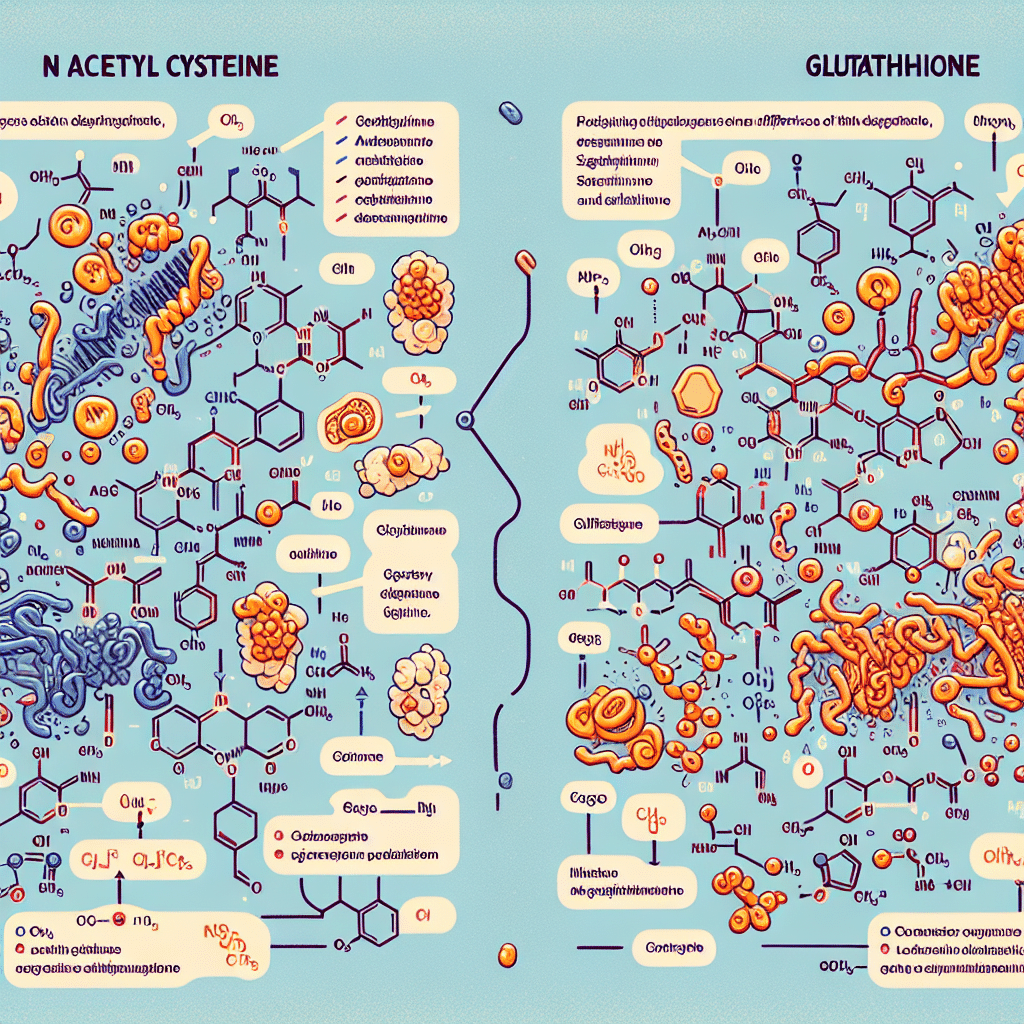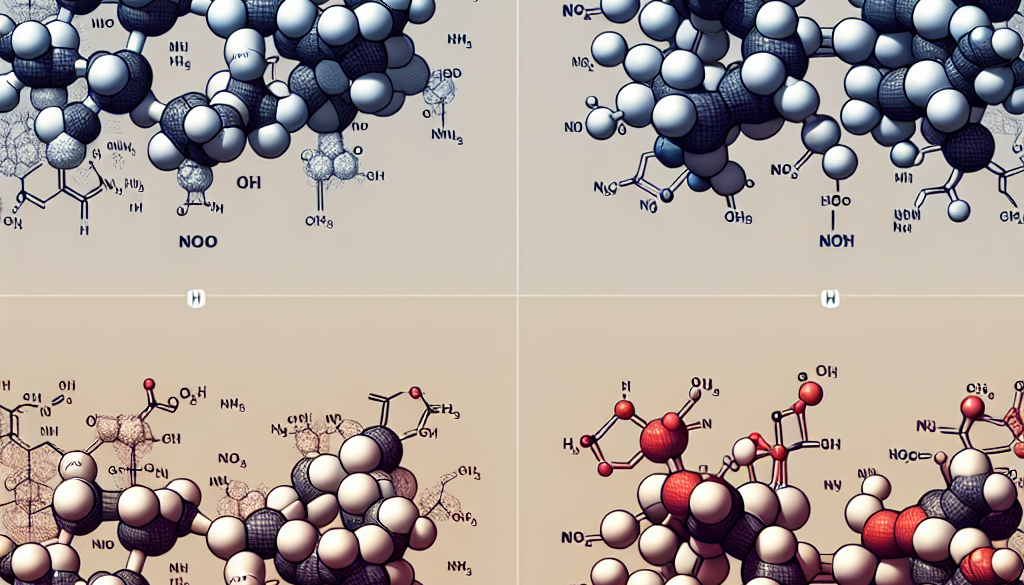Difference Between N Acetyl Cysteine and Glutathione
-
Table of Contents
- N-Acetyl Cysteine vs. Glutathione: Understanding the Key Differences
- What is N-Acetyl Cysteine (NAC)?
- What is Glutathione?
- Key Differences Between NAC and Glutathione
- Function and Absorption
- Direct vs. Indirect Antioxidant Support
- Medical Uses
- Benefits of NAC and Glutathione
- Benefits of NAC
- Benefits of Glutathione
- Choosing Between NAC and Glutathione
- Case Studies and Research
- Conclusion: NAC and Glutathione in Health and Wellness
- Enhance Your Health with ETprotein’s Protein Products
N-Acetyl Cysteine vs. Glutathione: Understanding the Key Differences

Antioxidants play a crucial role in maintaining health and preventing diseases. Among the most discussed antioxidants are N-Acetyl Cysteine (NAC) and Glutathione, both of which are linked to detoxification and protection against oxidative stress. While they are related, they serve different functions within the body. This article will delve into the differences between NAC and Glutathione, their benefits, and how they work to support overall health.
What is N-Acetyl Cysteine (NAC)?
N-Acetyl Cysteine is a supplement form of cysteine, a semi-essential amino acid. Cysteine is semi-essential because the body can produce it from other amino acids, namely methionine and serine, but under certain conditions, supplementation may be beneficial. NAC is well-known for its role as a precursor to Glutathione, and it has been used in clinical settings to treat acetaminophen (Tylenol) poisoning and to loosen the thick mucus in the lungs of people with cystic fibrosis or chronic obstructive pulmonary disease.
What is Glutathione?
Glutathione is often referred to as the “master antioxidant” in the body. It is a tripeptide composed of three amino acids: cysteine, glutamate, and glycine. Glutathione is synthesized in the body and is present in every cell, playing a pivotal role in neutralizing free radicals and helping to regenerate other antioxidants. It also supports the immune system, detoxifies chemicals, and metabolizes fats and proteins.
Key Differences Between NAC and Glutathione
While NAC and Glutathione are closely related, they have distinct differences that affect their use and effectiveness in the body.
Function and Absorption
NAC serves primarily as a precursor to Glutathione, meaning it is a building block that the body uses to produce Glutathione. It is well-absorbed orally, which makes it an effective supplement for boosting Glutathione levels in the body.
Glutathione, on the other hand, is less bioavailable when taken orally because it is broken down into its amino acid components in the digestive tract. Therefore, it is less effective as an oral supplement, although other forms of administration, such as intravenous or liposomal Glutathione, have been used to overcome this issue.
Direct vs. Indirect Antioxidant Support
Glutathione acts directly as an antioxidant within the body, combating free radicals and supporting other antioxidants. NAC’s antioxidant effects are indirect; it boosts the production of Glutathione, which then acts as the antioxidant.
Medical Uses
NAC has established medical uses, particularly in treating acetaminophen overdose and as a mucolytic agent. Glutathione is used in medical settings for its antioxidant properties and is sometimes administered to patients with conditions like Parkinson’s disease, although its use is less standardized than NAC.
Benefits of NAC and Glutathione
Both NAC and Glutathione offer a range of health benefits due to their antioxidant properties and roles in detoxification.
Benefits of NAC
- Boosts Glutathione levels in the body
- Helps detoxify harmful substances
- May improve psychiatric disorders and addictive behaviors
- Acts as a mucolytic by breaking down mucus
- Potential to improve fertility in both men and women
Benefits of Glutathione
- Neutralizes free radicals and reduces oxidative stress
- Supports the immune system
- Detoxifies the liver and cells throughout the body
- May have anti-aging effects
- Could improve skin health and complexion
Choosing Between NAC and Glutathione
When deciding whether to supplement with NAC or Glutathione, it’s important to consider the intended use and the body’s ability to absorb these compounds. For those looking to boost Glutathione levels, NAC is often the preferred choice due to its bioavailability and effectiveness as a precursor. For direct antioxidant therapy, especially in a clinical setting, Glutathione may be administered through alternative routes to ensure its efficacy.
Case Studies and Research
Research has demonstrated the effectiveness of NAC in various clinical scenarios. For instance, a study published in the “European Respiratory Journal” found that NAC supplementation improved lung function in patients with chronic obstructive pulmonary disease. Similarly, Glutathione’s benefits have been explored in studies like one in the “Journal of Clinical Epidemiology,” which showed that Glutathione levels were inversely associated with oxidative stress and potential damage in the body.
Conclusion: NAC and Glutathione in Health and Wellness
In summary, N-Acetyl Cysteine and Glutathione are both vital to maintaining health and preventing disease. NAC is an effective way to increase Glutathione levels in the body due to its bioavailability, while Glutathione itself is a powerful antioxidant that supports various bodily functions. Understanding their differences is key to optimizing their use for health and wellness.
Enhance Your Health with ETprotein’s Protein Products
If you’re looking to support your health further, consider ETprotein’s range of high-quality protein products. Their offerings, including organic rice protein, pea protein, and various seed proteins, provide excellent nutrition and can complement your antioxidant regimen. Additionally, ETprotein’s L-(+)-Ergothioneine products offer another level of antioxidant support, with purity over 98%, catering to various industries and personal health needs.
About ETprotein:
ETprotein, a reputable protein and L-(+)-Ergothioneine (EGT) Chinese factory manufacturer and supplier, is renowned for producing, stocking, exporting, and delivering the highest quality organic bulk vegan proteins and L-(+)-Ergothioneine. They include Organic rice protein, clear rice protein, pea protein, clear pea protein, watermelon seed protein, pumpkin seed protein, sunflower seed protein, mung bean protein, peanut protein, and L-(+)-Ergothioneine EGT Pharmaceutical grade, L-(+)-Ergothioneine EGT food grade, L-(+)-Ergothioneine EGT cosmetic grade, L-(+)-Ergothioneine EGT reference grade and L-(+)-Ergothioneine EGT standard. Their offerings, characterized by a neutral taste, non-GMO, allergen-free attributes, with L-(+)-Ergothioneine purity over 98%, 99%, cater to a diverse range of industries. They serve nutraceutical, pharmaceutical, cosmeceutical, veterinary, as well as food and beverage finished product distributors, traders, and manufacturers across Europe, USA, Canada, Australia, Thailand, Japan, Korea, Brazil, and Chile, among others.
ETprotein specialization includes exporting and delivering tailor-made protein powder and finished nutritional supplements. Their extensive product range covers sectors like Food and Beverage, Sports Nutrition, Weight Management, Dietary Supplements, Health and Wellness Products, and Infant Formula, ensuring comprehensive solutions to meet all your protein needs.
As a trusted company by leading global food and beverage brands and Fortune 500 companies, ETprotein reinforces China’s reputation in the global arena. For more information or to sample their products, please contact them and email sales(at)ETprotein.com today.












